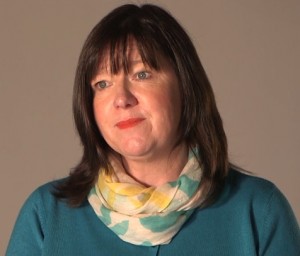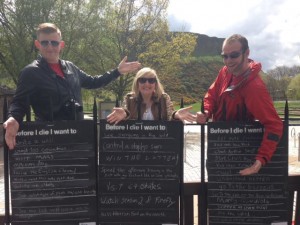News
Shopping and Mopping? Think again.

In this special blog to mark Death Awareness Week Scotland, Jane Perry discusses palliative and end of life care from her perspective as Operations Director for Bluebird Care, a provider of private care at home.
The work done by care at home support workers is definitely not the “shopping and mopping” service so cruelly described by many. Bluebird Care staff have to deal with all kinds of situations. From getting up in the cold dark mornings facing the rush hour traffic, to supporting someone to die how they choose in their own home – Bluebird Care staff are big hearted, passionate caring professionals who deserve to be recognised for the hard work they do in the community.
I’m very proud of our teams and every single one of them knows this. If as an employer I don’t look after our front line workforce, who will look after our customers?
With this in mind, at the Bluebird Care Offices in Edinburgh we have a “Zen Room” that any of our staff can pop in to use – whether on a break, having their lunch, or working on a SVQ qualification. If one of our customers has died, we use this room for support and comfort as part of the grieving process. It’s a very tranquil space, usually with a scented candle, water feature, soft furnishings and forest mural on the wall.
We are providing more and more end of life and palliative care and I want to make sure all our staff is equipped to deal with this. We provide training in this area to all staff who are interested. We now provide staff with training in “Innovation in Death; The Last Taboo” and I’ve found this has really helped staff to have confidence and expertise in supporting our customers towards the end of life.
We also want to find appropriate ways of opening up the conversation about death with our customers - we want to make this previously taboo subject something openly discussed and planned for. We come into this world with a birth plan, so why not have a death plan too?! We are hosting a Death Café on 10th May in our Edinburgh office as part of Death Awareness Week and can’t wait to get tongues wagging.
Bluebird Care have been trading in Edinburgh for 9 years and in Glasgow for nearly 4 years. Being a quality care at home provider involves a lot of thinking on your feet, improvisation and tenacity, and I have dealt with all kinds of situations over the years. It’s been a real rollercoaster from trying to find private care at home for my terminally ill grandmother to being recognised as a finalist in the forthcoming Scottish Care Provider of the Year Awards has been quite a journey. I’ve laughed, I’ve cried and I have hopefully helped hundreds of people remain independent at home for as long as possible.
As Operations Director for both businesses, I feel very responsible for spinning all the plates to make sure everyone receives the first class care we promise them. I also want to ensure that our staff have the opportunity to have a career in care should they wish. I look forward to the future and to working with like-minded individuals and organisations in raising the profile of our sector.
Jane Perry, Operations Director, Bluebird Care Edinburgh and Bluebird Care Glasgow.No One Dies Alone

In this special blog to mark Death Awareness Week Scotland, Alison Bunce talks about Compassionate Inverclyde, a programme aiming to enable and empower individuals and communities to help and support each other at times of increased health need, at end of life and in bereavement.
What is a compassionate community?
Prof Allan Kellehear and colleagues provide a helpful answer to that question in the “Compassionate City Charter” (2016):
“A community that publicly encourages, facilitates, supports and celebrates care for one another during life’s most testing moments and experiences…. and that recognises that care for one another at times of crisis and loss is not simply a task solely for health and social services but is everyone’s responsibility”.
In Inverclyde, we’re using shorter words, but that it basically what we’re trying to create. We’re working to build a “compassionate community” based on three things... compassion, help and neighbourliness.
Compassion is about people undertaking acts of kindness. Help is about both providing help, and enabling people who are in need to say ‘yes’. And neighbourliness is about ordinary people helping ordinary people.
Launched in March, the Compassionate Inverclyde Programme aims to enable and empower individuals and communities to help and support each other at times of increased health need, at end of life and in bereavement, recognising the importance of families, friends and communities working alongside formal services.
One way we’re planning to do this is through the No-one Dies Alone (NODA) programme...
NODA is an all-volunteer, grassroots program which provides support to those in their last hours of life who do not have family or friends available to be with them at this time.
NODA originated in the USA, when an American nurse Sandra Clarke failed to be with a patient who had asked her to be with him when he died. Sandra got caught up with other duties and when she returned to the patient’s room he had died. This troubled her for many years and she went onto develop the NODA programme.
I’m pleased to be involved in the first Scottish pilot of the NODA programme, at Inverclyde Royal Hospital. It will become one of over 200 hospitals across the world running the programme, joining over 200 hospitals in the USA, Singapore and Canada.
Through this and other initiatives, were hoping that the Compassionate Inverclyde will have a transformative effect on the community of Inverclyde, developing social capital, building community capacity and resilience and positively influencing the lives of individual community members.
Alison Bunce, Compassionate Inverclyde Programme Lead
How aware are we of the impact of caring for older people?

In this special blog to mark Death Awareness Week Scotland, Katharine Ross discusses the enormous contribution made by front line support workers employed in care homes and care at home organisations to the delivery of palliative and end of life care for older people. She asks:
"Can we honestly say that we adequately resource the social care sector to train its staff to an appropriate palliative level?
"Do we ensure sufficient time is given for a care at home support worker, to listen, to have open conversations, hold somebody’s hand, to comfort, provide love, to wipe a tear of fear away?"
“You know, I’ve never actually
really believed that death is inevitable.
I just think it’s a rumour.”
This quote from David Carridine – actor and martial artist - makes me smile. When asked about his attitude towards death, Carradine responded tongue in cheek and proffered the case that death is “just a rumour”.
If only! We know dying will come to us all, and most people reading this will have experienced the death of a loved one, or somebody significant in their life. The loss, the sadness, the devastating grief - all so very real and often so utterly overwhelming.
Death is happening everywhere; it’s most definitely not a rumour. In Scotland around 54,000 people die each year and over 200,000 people are significantly affected by the death of a loved one. In general, we are dying at older ages - sometimes accompanied by frailty, dementia and multiple medical conditions. The number of people dying each year is rising, driven by population growth. By 2037 the number of people dying each year will have gone up by 12% to 61,600. It is thought that up to 8 out of 10 people who die have needs that could be met through the provision of palliative care.
With this knowledge Scottish Care decided to undertake a significant piece of research at the end of 2016 which sought to explore and describe the experiences of front line support workers employed in care homes and care at home organisations who were involved in the delivery of palliative and end of life care for older people.
At four locations across the country my Scottish Care colleagues and I were privileged - and often moved to tears - listening to examples of compassionate end of life care. We heard extraordinary stories of physical, practical, social, emotional and spiritual support being given to older people - all of which was being delivered by dedicated, committed front line support workers who provide the largest proportion of palliative and end of life care in Scotland.
We captured extraordinary stories such as the care home staff team who formed a guard of honour as a resident left their home for the last time.
We listened while front line social care workers – all too often underpaid and undervalued - shared their experiences of caring for older people at the end of their lives, often with little or no specialised training. One participant said quietly:
“I want to be able to explain to somebody exactly what’s going to happen (when they die). I want to be able to stop someone being afraid”
We also heard the challenges involved in having open conversations about dying. As another support worker said:
“I don’t know what to say….it can be overwhelming. We try and say what we think is right. It just comes out.
…You feel like you’re apologising all the time”
I suppose what we really captured was the human impact of delivering care at the end of someone’s life, and of doing this in challenging conditions on a regular basis - for multiple people.
Indeed, a focus group participant was the inspiration for the title of our publication. “We are the trees that bend in the wind” is how this person described a workforce which adapts, changes and flexes to the journey of palliative and end of life care, and experiences it with the supported person.
But this phrase also relates to a workforce under sometimes intolerable pressure and strain, at risk of breaking, or at least of losing part of oneself in the process of providing end of life care. Delivering palliative and end of life care to older people requires highly skilled, technical and practical interventions. It also involves providing emotional support, a familiar face, a hand to hold, family liaison and so many more forms of care and support that cannot be captured in any job title, not least ‘a support worker’.
In our report, Scottish Care have made 12 recommendations. Some relate to the individual who is dying – for example the development of work which embeds a human rights-based approach to the exercising of choice and control at the end of life, especially relating to the rights of older people. Dying of frailty or dementia, for example, should have a specific pathway in the same manner as those which have been successfully developed for cancer and other conditions. Scottish Care believes the very real issues of ageism and resultant chronic underfunding of Scotland’s older people who need care and support must be addressed as part of this.
Other recommendations relate to the workforce, and to the policy conditions which ultimately dictate practice.
There has to be a greater emphasis on honest & open conversations about how we pay for and commission palliative and end of life care – especially for older adults. Can we honestly say that we adequately resource the social care sector to train its staff to an appropriate palliative level? Do we ensure sufficient time is given for a care at home support worker, to listen, to have open conversations, hold somebody’s hand, to comfort, provide love, to wipe a tear of fear away?
The answer is no.
Death is not a rumour; it’s very real and we need open, honest and progressive conversations about the delivery and funding of palliative and end of life care in Scotland as a matter of priority. Scottish Care welcomes the opportunity to work with The Scottish Partnership for Palliative Care – and others – to ensure this happens.
Katharine Ross - National Workforce Development Lead - Scottish Care. The Scottish Care report Trees that bend in the wind can be accessed here:
Trees that Bend in the Wind: Exploring the Experiences of Front Line Support Workers Delivering Palliative and End of Life Care
advance care planning condensed into a small origami game...
In the run-up to Death Awareness Week Scotland next week, we're delighted to launch a brand new resource - a mini-advance care planning prompt... in the form of a small origami game.

You remember the folded up paper game you used to get at school? You might have known it as a fortune teller... We have taken the format and filled it with engaging questions about planning ahead.
We're always looking for intriguing new ways to encourage people to plan ahead for illness and death, and are pleased to have worked with colleagues at NHS Lothian to produce this new resource. You can download and print the game, free of charge, here: Advance Care Planning origami fortune teller game
The new resource encourages people to 'plan your own future', and includes prompts and information relating to legal, medical, practical and personal aspects of advance care planning.
More information about how to print, fold and play the game is available here: Origami ACP
Awareness Week 2017

Every year in May, Good Life, Good Death, Good Grief holds an Awareness Week, providing individuals and organisations with an opportunity to promote the positives of living in a society where people can be open about dying, death and bereavement.
In previous years we have seen all kinds of events including death cafes, conferences, art exhibitions, information sessions, film screenings, craft workshops and before I die walls.
Organisations and individuals across Scotland will be holding events to mark the occasion, as well as making a noise over social media. Find out more about how to get involved below...